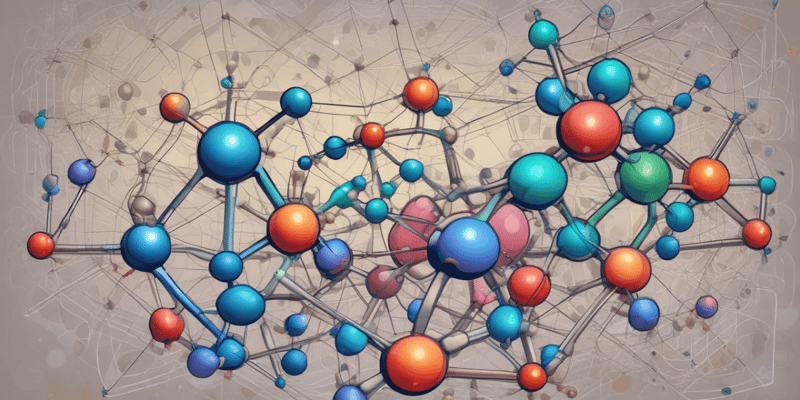Questions and Answers
Which type of compounds consist of a central metal ion bonded to multiple ligands?
Coordination compounds
What is the main difference between coordination compounds and their constituent elements?
Chemical composition
In which field are coordination polymers commonly used?
Electronics
Which category of elements includes lanthanides and actinides?
Signup and view all the answers
Which type of compounds, such as oxides and halides, exhibit unique physical and chemical properties?
Signup and view all the answers
What are lanthanides commonly used for in television screens?
Signup and view all the answers
Where are d block elements located in the periodic table?
Signup and view all the answers
Which type of compounds are commonly found in your kitchen?
Signup and view all the answers
What type of substances are excluded from the study of inorganic chemistry?
Signup and view all the answers
Which elements are often referred to as rare earth metals?
Signup and view all the answers
Which group of elements fills the 4f orbitals in the periodic table?
Signup and view all the answers
What do the D and f block elements have in common?
Signup and view all the answers
Study Notes
Inorganic Chemistry: Unveiling the World of Metals and Non-Metals
Inorganic chemistry, a vast branch of chemistry, explores the properties and interactions of elements in their pure states and in compounds, excluding carbon-based substances. This field encompasses a variety of topics, including the study of D and f block elements, which we'll delve into further.
Inorganic Compounds and their Building Blocks
Inorganic compounds are found everywhere, from the humble salt in your kitchen to the complex catalysts in industrial processes. They include metal oxides, metal halides, and numerous coordination compounds. The periodic table arranges elements into groups based on their electron configurations and properties, which aids in understanding their behavior in chemical reactions.
Inorganic Chemistry Subtopics
D and f Block Elements
D and f block elements, also known as transition metals, lanthanides, and actinides, possess unique properties due to their partially filled electron shells.
- The d block elements (D) are found in rows 4 to 7 of the periodic table. They include elements like iron, copper, and titanium.
- Lanthanides (Ln) are 15 elements in the f block, filling the 4f orbitals. They are often referred to as the rare earth metals and include elements like lutetium and cerium.
- Actinides (Ac) are the remaining elements in the f block, filling the 5f orbitals. They include elements like thorium and uranium.
These elements form a variety of compounds, such as oxides, halides, and coordination compounds, which exhibit unique physical and chemical properties. For example, lanthanides are used as phosphors in television screens and actinides are important in nuclear energy.
Coordination Compounds
Coordination compounds (also known as complexes) consist of a central metal ion or atom bonded to multiple ligands, which can be anions, molecules, or neutral species. These compounds frequently exhibit unique properties such as color, magnetic behavior, and reactivity that differ from their constituent elements. Coordination chemistry is a vast field in its own right and has numerous applications, including catalysis, coordination polymers, and magnetic materials.
Inorganic chemistry offers a fascinating glimpse into the world of elements, their compounds, and their interactions. Its application in diverse fields, such as energy, electronics, and medicine, highlights the importance of understanding this vast and intriguing field of study.
Studying That Suits You
Use AI to generate personalized quizzes and flashcards to suit your learning preferences.
Description
Delve into the realm of inorganic chemistry, which focuses on the properties and interactions of elements, excluding carbon-based compounds. Learn about inorganic compounds like metal oxides and coordination compounds, as well as subtopics including D and f block elements. Discover how inorganic chemistry plays a crucial role in various industries and scientific advancements.




